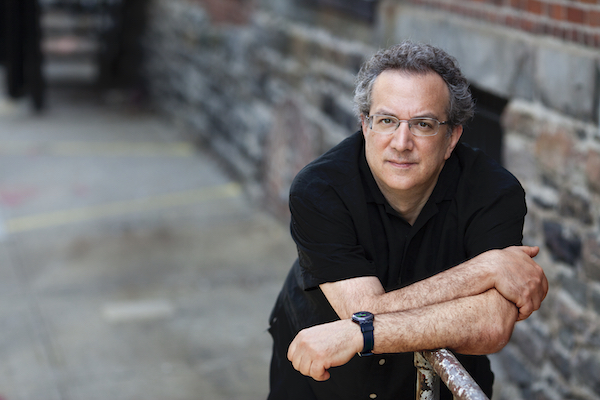Jan 13, 2026 2:09 PM
More Trump-Kennedy Center Cancellations
The fallout from the renaming of the John F. Kennedy Center for the Performing Arts to include President Donald…

Uri Caine’s most recent album celebrates the work of civil-rights advocate Octavius Catto (1839–’71).
(Photo: Courtesy of Artist)Pianist Uri Caine had no idea that his 10-part oratorio, The Passion Of Octavius Catto, would somehow gain additional cultural relevance in the five years since he first performed it.
The piece, a celebration of Catto—an African American civil-rights pioneer—had its premiere in Philadelphia during 2014. In some ways, that now feels like a different era. President Barack Obama was halfway through his second term, and Donald Trump had yet to announce his bid for the White House. The Charlottesville, Virginia, riots were three years away.
In 2018, Caine decided to record the oratorio, soliciting funds via Kickstarter. The album, which was released in August on the 816 Music label, arrives at a time when there are heated discussions about the nation’s racism—both past and present. The oratorio serves not only as a celebration of one man’s life but also as a reminder of our country’s long, painful history of brutal oppression.
“The very disturbing aspects of the story, the racism that existed … all the indignities and the things that were happening inspired a different kind of music,” Caine, 63, said in a phone interview. The piece, he explained, was more “dissonant” as a result.
Although he is quite historically significant, Catto is not as well known as such 19th-century African-American figures as Booker T. Washington and W.E.B. Du Bois. Born in Charleston, South Carolina, in 1839, Catto grew up primarily in Philadelphia. An advocate of education and equal rights, he helped push Pennsylvania to ratify the 15th Amendment, which extended voting rights to black men. Catto served as principal at the Institute for Colored Youth (now Cheyney University of Pennsylvania), and he was also an accomplished baseball player.
On an election day, Oct. 10, 1871, Catto was shot and killed by an Irish man named Frank Kelly while on his way to vote, as racial tensions in Philadelphia were cresting. In 2017, nearly 150 years after his death, a statue of Catto was erected outside Philadelphia’s City Hall. It was the city’s first public statue honoring an African American.
Caine, who is fluent in jazz and classical idioms, and has performed with the likes of Dave Douglas and Christian McBride, sought to channel Catto’s eventful but truncated life in his 10-part piece, which was commissioned by Philadelphia’s Mann Center. Each musical “chapter,” as Caine put it, zeroes in on a different aspect of history. The rousing “No East No West” incorporates lines from Catto’s speeches at two different voting-rights conventions. The oratorio, which features singer Barbara Walker and two vocal ensembles, packs a punch, incorporating elements of gospel, jazz and classical music.
Even though the composer is a Philadelphia native—whose father, Burton Caine, served as president of the Greater Philadelphia branch of the American Civil Liberties Union—he was not very familiar with Catto’s life prior to this project. His research for the piece centered on the 2010 book Tasting Freedom: Octavius Catto and the Battle for Equality in Civil War America by Daniel R. Biddle and Murray Dubin.
André Raphel, who served as the oratorio’s conductor, said the piece—along with Catto’s message of unity and equality—could not be more urgent today. “All these attempts to divide,” he mused, “that’s not what this country is about. That’s not what it’s about. We should be trying to live together as one.”
On March 19–21, 2020, the Boston Symphony Orchestra—with Caine, Walker and other guests—will perform the piece at Boston Symphony Hall. Caine said he hopes that Catto’s tale will help people see connections between the 19th-century and the current day. “It’s part of history,” he said. “It still explains what we see today.” DB

Belá Fleck during an interview with Fredrika Whitfield on CNN.
Jan 13, 2026 2:09 PM
The fallout from the renaming of the John F. Kennedy Center for the Performing Arts to include President Donald…

Peplowski first came to prominence in legacy swing bands, including the final iteration of the Benny Goodman Orchestra, before beginning a solo career in the late 1980s.
Feb 3, 2026 12:10 AM
Ken Peplowski, a clarinetist and tenor saxophonist who straddled the worlds of traditional and modern jazz, died Feb. 2…

The success of Oregon’s first album, 1971’s Music Of Another Present Era, allowed Towner to establish a solo career.
Jan 19, 2026 5:02 PM
Ralph Towner, a guitarist and composer who blended multiple genres, including jazz — and throughout them all remained…

Rico’s Anti-Microbial Instrument Swab
Jan 19, 2026 2:48 PM
With this year’s NAMM Show right around the corner, we can look forward to plenty of new and innovative instruments…

Richie Beirach was particularly renowned for his approach to chromatic harmony, which he used to improvise reharmonizations of originals and standards.
Jan 27, 2026 11:19 AM
Richie Beirach, a pianist and composer who channeled a knowledge of modern classical music into his jazz practice,…